外研版初中英语知识点归纳
- 格式:docx
- 大小:89.59 KB
- 文档页数:24
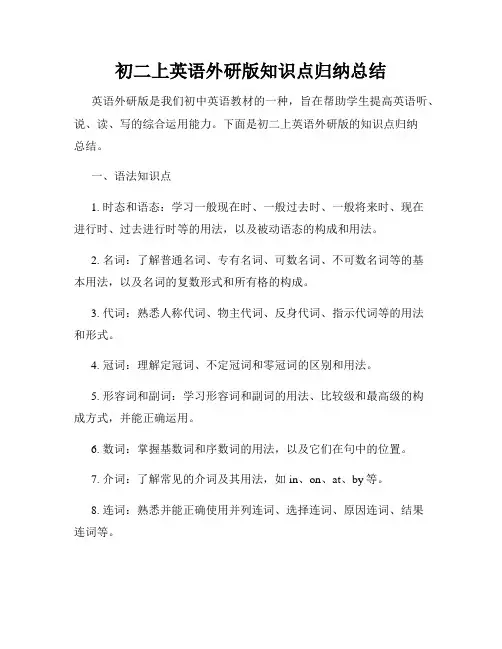
初二上英语外研版知识点归纳总结英语外研版是我们初中英语教材的一种,旨在帮助学生提高英语听、说、读、写的综合运用能力。
下面是初二上英语外研版的知识点归纳总结。
一、语法知识点1. 时态和语态:学习一般现在时、一般过去时、一般将来时、现在进行时、过去进行时等的用法,以及被动语态的构成和用法。
2. 名词:了解普通名词、专有名词、可数名词、不可数名词等的基本用法,以及名词的复数形式和所有格的构成。
3. 代词:熟悉人称代词、物主代词、反身代词、指示代词等的用法和形式。
4. 冠词:理解定冠词、不定冠词和零冠词的区别和用法。
5. 形容词和副词:学习形容词和副词的用法、比较级和最高级的构成方式,并能正确运用。
6. 数词:掌握基数词和序数词的用法,以及它们在句中的位置。
7. 介词:了解常见的介词及其用法,如in、on、at、by等。
8. 连词:熟悉并能正确使用并列连词、选择连词、原因连词、结果连词等。
9. 从句:了解主从复合句的构成和用法,包括宾语从句和定语从句等。
二、词汇知识点1. 日常生活词汇:掌握与学生日常生活密切相关的词汇,如身体部位、学科、家庭成员等。
2. 动词短语:学习常用的动词短语,如get up、go on holiday、take care等。
3. 学科词汇:了解和掌握与英语学科相关的词汇,如book、notebook、dictionary等。
4. 食物词汇:熟悉和运用与食物相关的词汇,如fruit、vegetable、meat等。
5. 动物词汇:学习各种动物的名称,如elephant、panda、tiger等。
三、阅读技巧1. 短文阅读:熟悉短文的结构,能快速获取信息和理解文章的主旨。
2. 阅读策略:掌握一些有效的阅读理解策略,如扫读、略读、细读等。
3. 理解词义:通过上下文来推断词义,提高词汇理解和运用能力。
四、听力技巧1. 日常交际:提高听懂常用的日常交际语言,如问候、道歉、提问、回答等。
2. 短对话和长对话:理解并提取对话中的关键信息,回答问题或完成任务。
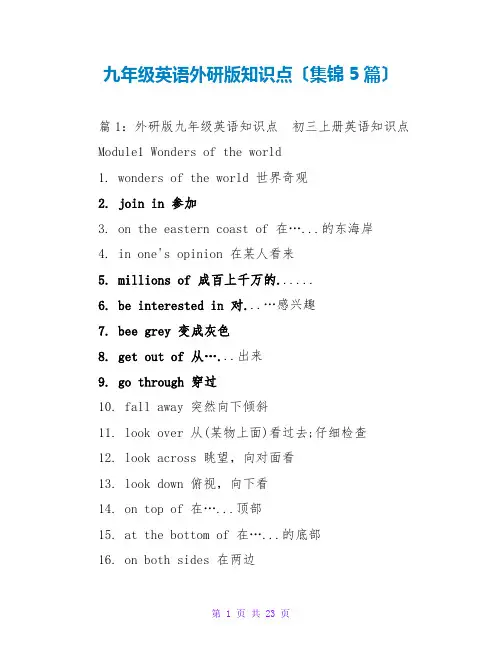
九年级英语外研版知识点〔集锦5篇〕篇1:外研版九年级英语知识点初三上册英语知识点Module1 Wonders of the world1. wonders of the world 世界奇观2. join in 参加3. on the eastern coast of 在…...的东海岸4. in one's opinion 在某人看来5. millions of 成百上千万的......6. be interested in 对...…感兴趣7. bee grey 变成灰色8. get out of 从…...出来9. go through 穿过10. fall away 突然向下倾斜11. look over 从(某物上面)看过去;仔细检查12. look across 眺望,向对面看13. look down 俯视,向下看14. on top of 在…...顶部15. at the bottom of 在…...的底部16. on both sides 在两边17. look like 看起来像18. be famous for 因…...出名19. do an interview 做采访20. draw a picture of 画一幅…...的图画21. go down 下去,下沉22. high up 在高处23. more than 超过24. dozens of 数十个,许多25. in height 高度,在高度上Module2 Public holidays1. as soon as 一…...就......2. take a vacation 度假3. have a picnic 野餐4. play music 演奏音乐5. go somewhere interesting 去有趣的地方6. make short speeches 做简短的演讲7. give thanks for 感谢......8. grow corn 种植玉米九年级上学期英语课文知识点外研版所谓垂悬构造(The Dangling Construction)就是一个句子成分,如分词短语,不定式动词短语等,找不到被修饰的主语或被修饰的对象不合逻辑。
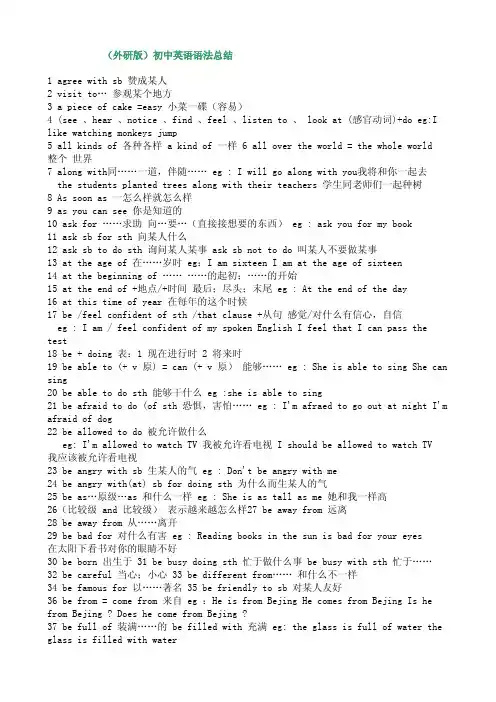
(外研版)初中英语语法总结1 agree with sb 赞成某人2 visit to… 参观某个地方3 a piece of cake =easy 小菜一碟(容易)4 (see 、hear、notice、find、feel、listen to 、 look at (感官动词)+do eg:I like watching monkeys jump5 all kinds of 各种各样 a kind of 一样6 all over the world = the whole world整个世界7 along with同……一道,伴随…… eg : I will go along with you我将和你一起去the students planted trees along with their teachers 学生同老师们一起种树8 As soon as 一怎么样就怎么样9 as you can see 你是知道的10 ask for ……求助向…要…(直接接想要的东西) eg : ask you for my book11 ask sb for sth 向某人什么12 ask sb to do sth 询问某人某事 ask sb not to do 叫某人不要做某事13 at the age of 在……岁时eg:I am sixteen I am at the age of sixteen14 at the beginning of …… ……的起初;……的开始15 at the end of +地点/+时间最后;尽头;末尾 eg : At the end of the day16 at this time of year 在每年的这个时候17 be /feel confident of sth /that clause +从句感觉/对什么有信心,自信eg : I am / feel confident of my spoken English I feel that I can pass thetest18 be + doing 表:1现在进行时 2 将来时19 be able to (+ v 原) = can (+ v 原)能够…… eg : She is able to sing She can sing20 be able to do sth 能够干什么 eg :she is able to sing21 be afraid to do (of sth 恐惧,害怕…… eg : I'm afraed to go out at night I'm afraid of dog22 be allowed to do 被允许做什么eg: I'm allowed to watch TV 我被允许看电视 I should be allowed to watch TV我应该被允许看电视23 be angry with sb 生某人的气 eg : Don't be angry with me24 be angry with(at) sb for doing sth 为什么而生某人的气25 be as…原级…as和什么一样 eg : She is as tall as me 她和我一样高26(比较级 and 比较级)表示越来越怎么样27 be away from 远离28 be away from 从……离开29 be bad for 对什么有害 eg : Reading books in the sun is bad for your eyes在太阳下看书对你的眼睛不好30 be born 出生于 31 be busy doing sth 忙于做什么事 be busy with sth 忙于……32 be careful 当心;小心 33 be different from…… 和什么不一样34 be famous for 以……著名 35 be friendly to sb 对某人友好36 be from = come from 来自 eg :He is from Bejing He comes from Bejing Is he from Bejing ? Does he come from Bejing ?37 be full of 装满……的 be filled with 充满 eg: the glass is full of water the glass is filled with water38 be glad+to+do/从句 39 be going to + v(原)将来时40 be good at(+doing) = do well in 在某方面善长,善于……41 be good for 对什么有好处 eg : Reading aloud is good for your English42 be happy to do 很高兴做某事43 be helpful to sb 对某人有好处eg : Reading aloud is helpful to you 大声朗读对你有好处Exercising is helpful to your bady 锻炼对你的身体有好处44 be in good health 身体健康45 be in trouble 处于困难中 eg : She is in trouble They are in tronble46 be interested in 对某方面感兴趣47 be late for = come late to 迟到 eg: Be late for class 上课迟到48 be like 像…… eg : I'm like my mother49 be mad at 生某人的气50 be made from 由……制成(制成以后看不见原材料)51 be made of 由……制成(制成以后还看得见原材料) 52 be not sure 表不确定53 be on a visit to 参观 54 be popular with sb 受某人欢迎55 be quiet 安静 56 be short for 表**的缩写 eg: 陶 is short for 陶俊杰57 be sick in bed 生病在床 58 be sorry to do sth be sorry for sb eg : I am sorry for you59 be sorry to hear that 60 be sorry to trouble sb eg : I am sorry to trouble you61 be strict in doing sth 严于做某事 eg : He's strict in obeying noles62 be strict with sb 对某人要求严格 eg: Some students are not strict with them selves 这些学生对自己不严格63 be strict with sb in sth 某方面对某人严格 64 be supposed to do 被要求干什么65 be sure 表确定 66 be sure of doing sth 对做某事有信心 eg: He is sure of winning I am sure of learning English well67 be sure of sth 对做某事有信心 eg: I'm sure of my head (my teacher我相信我的大脑(老师)68 be sure that sth 对做某事有信心 eg: I'm suer that he can pass the test我相信他能通过考试69 be sure to do sth一定会做某事eg: We are sure to pass the test我们一定会通过这次考试 We are sure to learn English well 我们一定能学好英语70 be terrified of + 名/动doing害怕…… 71 be terrified to do sth 害怕做某事72 be the same as … 和什么一样 73 be used to doing sth 习惯做某事eg: My father is used to getting up early 我爸爸习惯早He is used to sleeping in class 他习惯上课睡觉74 be worth doing 值得做什么 75 be(feel) afraid to do sth 害怕做某事be afraid of sth 害怕某物 be afraid that 丛句76 because+句子 because of +短语eg : He was late because he had a headache He was late because of his headache 77 begin to do = start to do 开始做某事 start…with…=begin…with…以什么开始什么eg : Let's begin the game with the song I begin to go home78 between…and… 两者之间79 borrow sth from sb 向……借…… lend sth to sb ( lend sb sth 借给……什么东西eg : I borrowed a pen from him he lent a pen to me ( he lent me a pen80 both = the same(as) = not different(from) 表相同81 bother 打扰 bother sb to do stheg : I'm sorry to bother you ,but can you tell me to way to the station我十分道歉打扰你,但是你能告诉我怎么去车站the problem has been bothering me for weeks 这个问题困扰了我几个周了He's bothering me to lend him money82 by the end of 到……为止 83 call sb sth eg : We call him old wang84 care 关心 eg : Don't you care about this country's future?你为什么不关心国家的未来85 catch up with sb 赶上某人 86 chat with sb 和某人闲谈 take sb to + 地点带某人去某地87 come in 进88 come over to 过来89 come up with 提出 eg: Can you come up with a good idea 你能想出一个好办法吗?90 communicate with sb 和某人交流91 consider + doing 考虑做什么 eg : Why not consider going to lu zhou为什么不考虑去泸州?92 dance to 随着……跳舞 eg : She likes dancing to the music 她喜欢随着音乐跳舞93 decide to do sth 决定做某事 94 do a survey of 做某方面的调查 95 do better in 在……方面做得更好96 do wrong 做错 97 Don't forget to do sth 不要忘了做某事 98 Don't mind +doing /从句/名词不要介意……99 each +名(单)每一个…eg : Each student has many books 每一个学生都有一些书100 end up +doing 101 enjoy +doing喜欢 102 escape from 从……逃跑eg: The prisoners have escaped from the prison犯人从监狱里逃跑出来 103 expect to do sth 期待做某事 104 fall down 摔下来 fall off 从哪摔下来 105 fall in love with sb/sth 爱上什么106 far from 离某地远 eg : The school is far from my home 107 find +it +adj +to do 发现做某事怎么样108 find sb/sth +adj 发现什么怎么样 eg : I find the book interesting 109 finish 完成+doing(名词)110 fit to sb = be fit for sb 适合某人 111 forget to do 没有做而忘了 forget doing 做了而又忘了 eg: Don't forget to go home I forget closing door 112 from…to… 从某某到某某 eg: From me for her113 get /have sth down 做完,被(别人)做…eg: I have my hair cut我理了发(头发被剪了)Tom got his bad tooth pulled out 汤母把他的坏牙拔掉了(被牙医拔掉了)114 get a part-time job= find a part-time job 115 get along well with sb = get on well with sb 与某人相处得好116 get along with sb = get on with sb 与某人相处 117 get ready for = be ready for为什么而准备eg : I get ready for math I am ready for math 118 get sb in to trouble 给某人麻119 get sb to do sth120 get…from… 从某处得到某物 121 give a talk 做报告 eg: He is give a tall122 give sth to sb give sb sth 给某人某物 123 go fish 钓鱼 go swimming 游泳124 go on to do 去做下一件事 go on doing 继续做这件事 125 go out away from go out of126 go to school 上学(用于专业的)go to the school 去学校(不一定是上学) 127 good way to 好方法128 hate to do 讨厌没做过的事 hate doing 讨厌做过的事129 have a party for sb 举办谁的晚会 130 have a talk 听报告谈一谈131 have been doing 现在完成进行时 eg : You have been talking You have been sleeping since132 have been to …( 地方)……去过某过地方 have gone to …(地方)去了某地还没回来133 have fun +doing 玩得高兴 134 have sth to do 有什么事要做eg: I have a lot of homework to do 我有很多家庭作业要做 I have nothing to do 我没什么事情做135 have to do sth 必须做某事136 have trouble (problem) (in) doing sth 做什么事情有麻烦137 have…time +doing138 have…(时间)…off放……假 eg: I have month off 我请一个月得假139 hear sb +do/doing 听见某人做某事/正在做某事140 help a lot 很大用处141 help sb with sth \one's sth 帮助某人某事(某方面) help sb (to) do sth帮助某人做某事142 hope to do sth 希望做某事143 How about(+doing) = What about(+doing)144 how do you like = what do you think of 你对什么的看法145 if : 是否=wethereg: I don't know if (wether) I should go to the party我不知道我是否应该去参加晚会He don't know if (wether) we will arrive on time tomorrow morning他不知道我们明天早上是否能准时到达146 if :如果,假如(全部接一般时态)+条件语态从句eg: I'll go to LuZhou if it does't rain 假如明天不下雨,我就去泸州If they change the plan they will let me know假如他们要改变计划,他们会让我知道的I'll go to England ,if I have enough money next year如果我明年由足够的钱,我就要去英国147 in one's opinion = sb think 某人认为148 in some ways 在某些方面149 in the end = finally(adv) 最后150 in the north of… 什么在什么的北方(north北 sowth 南 west 西 east 东)151 in the sun 在太阳下152 increase 增加eg : They've increased the prece of petrol by 3% 他们把石油价增加了3%the population has increased from 12 million ten years ago to 18 million now 153 instead of +(名)代替eg: I'd like an apple instead of a pear 我想要苹果,而不要梨子I like English instead of math 我喜欢英语而不喜欢数学154 introduce sb to sb 介绍某人给某人 introduce oneself 自我介绍155 invite sb to do sth 邀请某人做某事156 It takes sb sometime to do sth 做某人花掉某人多少时间eg : It took me 5 minutes to do my homework It takes me half an hour to cook157 It's +adj +for sb to do sth 对某人来说做某事怎么样158 It's +adj +to do 做某事怎么样159 It's +adj for sb 对于某人来说怎么样 It's +adj of sb 对某人来说太怎么样160 It's +adj(for sb) to do(对某人来说)做某事怎么样 It's +adj of sb to do sth 对某人来说做某事太怎么样eg : It's nice of you to help me with my English161 It's a good idea for sb to do sth 对……来说是个好主意162 It's important to sb 对某人来说很重要 eg: It's important to me163 It's time to do sth It's time for sth 到了该去做某事的时间eg : It's time to have class It's time for class 该去上课了164 join = take part in 参加165 just now 刚才166 keep +sb /sth +adj /介词短语让什么保持什么样?167 keep out 不让 …… 进入168 keep sb adj 让……保持…… eg: I want to keep my mother happy keep healthy 保持健康169 key to +名词表示:某物的钥匙或某题的答案170 key to… anser to … key 可以是答题或钥匙171 laugh at… 取笑…… eg : Don't langh at others We langhed at the joke172 learn by oneslfe 自学173 learn from sb 向某人学习 eg: We should learn from Lei Feng174 learn to do sth 学做某事175 let sb do sth 让某人做某事176 Let sb down 让某人失望 eg : We shouldn't let our farents down我们不应该让我们的父母失望177 live from :离某地远178 live in +大地方 /at +小地方居住在某地 eg: I live in LuZhou She lives at XuanTan179 look after = take care of 照顾照看180 lose one's way 谁迷路 eg : Lose your way 你迷路181 make a decision to do sth 决定做某事182 make friends with sb 和谁成为朋友 eg : I want to make friends with you183 make it early 把时间定的早一点184 make on exhibition of oneself 让某人出洋相185 make sb /n +n 使什么成为什么 eg : I made her my step moller I made you my wife186 make sb /sth +adj 使某人(某物)怎么样 eg : You must made your bed clean187 make sb /sth adj 使某人/某物怎么样188 make sb do sth 让某人做某事 eg : I made him write 我以前让他写189 make up be made up of (被动语态)由……组成190 make…difference to…191 mind sb to do mind one's doing 介意……做什么192 most +名 most of +代193 much too +形容词 194 must be 一定 195 need +名词196 need sb do sth 需要某人做某事 197 need to do (实义动词) need do (情态动词)198 no /neithr of hate to do no /neithr of hate doing199 no +名词200 not anymore = no more 再也不…… eg: He didn't cry any more He cried no more 他再也不哭201 not… (形、副)at all eg: He's not tall at all she doesn't junp far at all202 not…at all 一点都不203 not…either 表否定,也不 eg : I don't japanse either I don't have sister, either 我也没有姐姐204 not…until 直到……才……eg: I didn't sleep until my mother came back The child didn't stop crying until I give her sugar205 offer / provide sb with sth 给某人提供206 offer sb sth ( offer sth to sb 提供什么东西给某人 eg : I offer you water (I offer water to you 我给你提供水207 on one's way to… 在谁去那的路上208 on the one hand 一方面 on the other hand 另一方面209 on the phone = over the phone 用电话交谈210 on time 准时 in time 及时211 one day =some day =someday一天,有一天212 one of +可数名词的复数形式213 one to another 一个到另一个214 over and over agin 一遍又一遍的 eg : He cleaned the floor over and over agin 215 part-time job 兼职工作 fall-time job 全职工作216 pay for… 付……钱 pay the bill 开钱,付钱217 please +do218 please help yourself219 pleased with sb220 pool into = pore into221 practice +doing 练习做某事222 prefer sth to sth 相对……更喜欢…… eg : I prefer physics to chemisty在物理和化学中,我更喜欢物理prefer doing to sth 更喜欢去做…不愿意去做… eg: He prefers riding a bike to diving 他更喜欢骑自行车,不开小车prefer to do sth rather than do sth 宁愿做…也不愿eg: My unde prefers to buy a now car rather than repaiv the used one我叔叔更喜欢买新的车,也不去修旧车prefer sb not to do sth 更愿意… eg: I prefer her not to come 我不喜欢她不来223 pretend to do sth 装着去做什么 pretend that 从句eg : The two cheats pretended to be working very hard 这两个骗子装着努力工作He pretended that he did not know the answer 他装着不知道答案224 rather…than 宁可……也不……eg : I would rather be a doctor than a teacher 我愿肯当医生,也不当老师He likes dogs rather than cats 他喜欢狗,不喜欢猫225 regard…as 把……当作……eg: Please give my best regards to your family 请带我向你的家人我最好的问候I regard you as my friend 我把你当作我的朋友He shows little regard for others 他不爱关心别人226 remid sb about sth 提醒某人什么事 remid sb to do sth 提醒某人做某事eg : he remids me about cooking (he remids me to cook 他提醒我做饭227 remid sb of sth 使某人想起什么eg : the pictures remind me of my school days 这照片使我想起了我的学校the words that (which) the teacher talke to remind me of my mother228 return sth to sb 还什么东西给某人229 say to oneself 对自己说230 say to sb 对某人说231 sb spend somemoney on sth 花了多少钱在某事上232 sb spend sometime with sb 花了多少时间陪谁233 sb spend sometime(in) doing sth 花了多少时间做某事234 sb with sb +is sb and sb +are235 see sb do 看见某人做过某事 see sb doing 看见某人正在做某事236 seem to do/be +adj 显得怎么样 eg : You seem to be tired You seem to be happy 237 send +sb sth 送给某人某物238 send…to…把什么寄到哪里去?239 shock 使……震惊 eg : Oh , It's only you ! You give me a shock啊,是你呀!吓我一跳240 show sb sth 向某人展示某物 eg : I show her the book.241 show sb sth = show sth to sb 拿什么东西给某人看 eg: Show me your pen Show your pen to me242 show sth to sb 向某人展示某物 eg : I show the book to her.243 some…others… 一些……另一些……244 start…with… 从……开始 begin…with… 从……开始245 stay away from 远离……eg : We're told to stay away from the animals whe visiting the zoo当我们参观zoo时,我们要远离动物If you want to lose weight you'd better stay auay from the sweet food徒工你想减肥,你最好远离甜食246 stop doing 停下正在做的事247 stop sb from doing sth 阻止某人做某事248 stop sb(from) doing 阻止某人做某事249 stop to do 停下正在做的事去做下一件事250 such +名这样,这种251 suit sb 适合某人252 surprise sb 使某人惊奇 to one's surprise 令某人惊奇253 take classes 上课254 take sb to 把某人带去 eg : I take you to the hospital255 take walks = take a walk = go for a walk 散步256 ①talk to 对谁说 eg : I talk to you ② talk with 和谁说 eg : I talk with him③ talk of 谈到 eg : we talked of you ④ talk about 谈论关于……257 talk with sb 和某人说话258 teach sb sth 教某人做某事259 tell sb do sth 告诉某人做某事260 tell sb sth tell sb that 丛句 tell sb not to do sth tell a story261 tell sb sth 告诉某人某事262 tell sb to do sth 告诉某人做什么 tell sb not to do sth 告诉某人不要做什么263 tell…from…264 thank you for +doing265 the same +名词(doing)+as……266 the same…(名)…as as…(adj adv)…as 相同267 the way to do sth = the way of doing st做某方面的方法the way to +地方去哪的路e g :Do you know the way to learn English Do you know the way of learning English268 the way to…(地点)到哪的269 too…to… 太怎样而不能……adj +enough to足够…能… so…that +丛句eg: He is too young to go to school = He is so young that he can't go to school He is old enough to go to school = He is so old that he can go to school270 transalte ……into…… 把什么翻译成什么 eg : Trasalte English into chinese 271 travel with sb和某人去旅游272 try one's best to dosth尽某人最大的努力去做某事eg: I will try my best to learn English well 273 try to do sth 想干什么,但没成功 try doing sth 想干什么,已经做过了eg :He tried to climb 他想爬上去,但没成功 He tried climbing他想爬上去,已经做过了274 try…试衣服 have a try 试一下275 turn down 开小←→ turn up 开大276 turn off 关上←→ turn on 打开 open 拆开277 upside down 倒着278wait for sb 等某人。
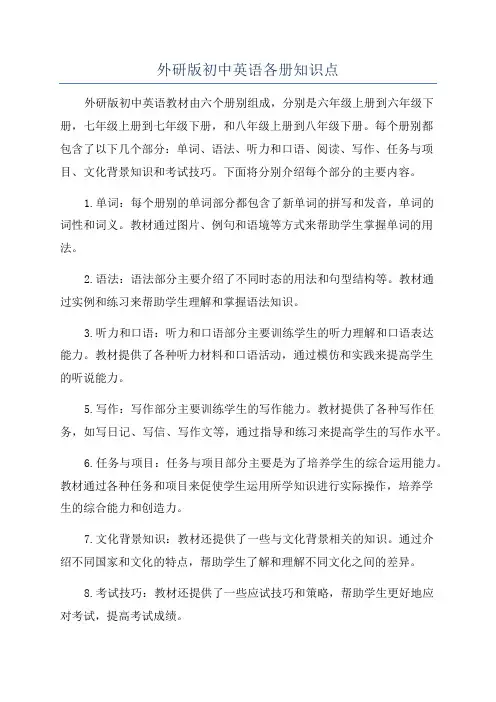
外研版初中英语各册知识点
外研版初中英语教材由六个册别组成,分别是六年级上册到六年级下册,七年级上册到七年级下册,和八年级上册到八年级下册。
每个册别都
包含了以下几个部分:单词、语法、听力和口语、阅读、写作、任务与项目、文化背景知识和考试技巧。
下面将分别介绍每个部分的主要内容。
1.单词:每个册别的单词部分都包含了新单词的拼写和发音,单词的
词性和词义。
教材通过图片、例句和语境等方式来帮助学生掌握单词的用法。
2.语法:语法部分主要介绍了不同时态的用法和句型结构等。
教材通
过实例和练习来帮助学生理解和掌握语法知识。
3.听力和口语:听力和口语部分主要训练学生的听力理解和口语表达
能力。
教材提供了各种听力材料和口语活动,通过模仿和实践来提高学生
的听说能力。
5.写作:写作部分主要训练学生的写作能力。
教材提供了各种写作任务,如写日记、写信、写作文等,通过指导和练习来提高学生的写作水平。
6.任务与项目:任务与项目部分主要是为了培养学生的综合运用能力。
教材通过各种任务和项目来促使学生运用所学知识进行实际操作,培养学
生的综合能力和创造力。
7.文化背景知识:教材还提供了一些与文化背景相关的知识。
通过介
绍不同国家和文化的特点,帮助学生了解和理解不同文化之间的差异。
8.考试技巧:教材还提供了一些应试技巧和策略,帮助学生更好地应
对考试,提高考试成绩。
综上所述,外研版初中英语教材通过单词、语法、听力和口语、阅读、写作、任务与项目、文化背景知识和考试技巧等方面的综合训练,全面提
高学生的英语综合能力。

最新外研版英语八年级上册知识点总结
(精华版)
1. 语法知识点
- 时态:包括一般现在时、一般过去时、一般将来时等;
- 基本句型:包括陈述句、疑问句、否定句等;
- 名词:包括可数名词、不可数名词、复数形式等;
- 代词:包括人称代词、物主代词、反身代词等;
- 形容词:包括形容词的比较级和最高级等;
- 副词:包括副词的用法和位置等;
- 连词:包括并列连词、选择连词、从属连词等;
- 介词:包括基本介词和常用介词短语等;
- 动词:包括动词的不同形式、时态和语态等;
- 句子结构:包括主谓结构、主语从句、宾语从句等;
- 非谓语动词:包括动词不定式、动名词和分词等;
2. 词汇知识点
- 单词拼写:包括常见的单词拼写错误;
- 同义词:包括一些常见的同义词辨析;
- 常用短语:包括日常交际中常用的短语;
- 常用惯用语:包括一些惯用语的正确使用;
3. 阅读技巧
- 阅读理解:包括快速阅读和细节理解;
- 阅读速度:包括提高阅读速度和理解能力的方法;
- 阅读技巧:包括推测词义、寻找关键词等技巧;
4. 写作技巧
- 书信写作:包括格式、语言表达和常用句型等;
- 日记写作:包括表达个人感受和经历的方法;
- 作文写作:包括如何组织思路和提高写作水平的方法;
以上是最新外研版英语八年级上册的知识点总结,希望对你的研究有所帮助。

外研版七年级英语上册M1-10重点知识大全Module1 My classmates重要知识点讲解Unit 1一、be动词的用法[点拨]1.be动词有三种形式: am, is, are,都是“是”的意思。
be动词与不同人称搭配:我(I)用am,你(you)用are; is用于他(he)她(she)它(it);单数is,复数are。
2.be动词的否定形式表达肯定句改为否定句时,直接在be动词后加not构成。
He is a teacher.他是一名老师。
(肯定句)He is not a teacher.他不是一名教师。
(否定句)3.be动词的一般疑问句表达陈述句改为一般疑问句时直接将be动词提到主语之前构成。
He is a teacher.他是一名老师。
(肯定句)Is he a teacher.他是一名教师吗?(疑问句)肯定回答:Yes, he is.是的,他是。
否定回答:No, he isn’t.不,他不是。
二、询问对方来自哪里的句型-Where are you from? 你来自哪里?-I'm from Beijing.我来自北京。
[点拨]"Where + be + 主语+ from?"意为“...来自哪里/是哪里人?”,多用于询问国籍/籍贯。
回答为“主语+be from+地点”。
be from意为“来自”,其中的be动词要随主语人称和数的变化而变化。
三、用于确定对方国籍的句型-Hi, are you English too?嘿,你也是英国人吗?-No, I’m not. I’m American and my name is Betty King. 不,我不是。
我是美国人,我叫贝蒂·金。
[点拨]"Are you+国籍?"通常在没有把握确定对方国籍时用此句型。
该句是一般疑问句,肯定回答用“Yes,I am.”否定回答用“No,I'm not.”。
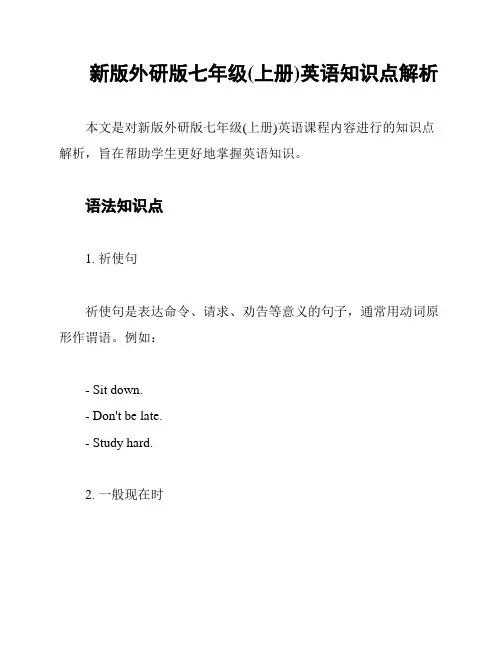
新版外研版七年级(上册)英语知识点解析本文是对新版外研版七年级(上册)英语课程内容进行的知识点解析,旨在帮助学生更好地掌握英语知识。
语法知识点1. 祈使句祈使句是表达命令、请求、劝告等意义的句子,通常用动词原形作谓语。
例如:- Sit down.- Don't be late.- Study hard.2. 一般现在时一般现在时表示现在经常、惯性的动作或者真理等。
一般现在时的肯定句结构为:主语 + 动词原形(第三人称单数要加-s)。
例如:- She often takes a bus to school.词汇知识点1. 数词数词用来表示数字、数量的词汇。
例如:- one, two, three, four- first, second, third, fourth2. 物品名称研究物品的名称可以帮助我们更好地了解和描述身边的事物。
例如:- pencil, eraser, ruler, book- desk, chair, blackboard, whiteboard交际知识点1. 问路当需要问路时,我们可以使用以下语句:- Excuse me, where is the nearest post office?- Can you tell me how to get to the library?2. 自我介绍自我介绍时,我们可以使用以下语句:- Hello/Hi, my name is ___. I am ___ years old.本文总结了新版外研版七年级(上册)英语课程中的相关语法、词汇、交际知识点,帮助学生更好地掌握英语知识,提高英语水平。
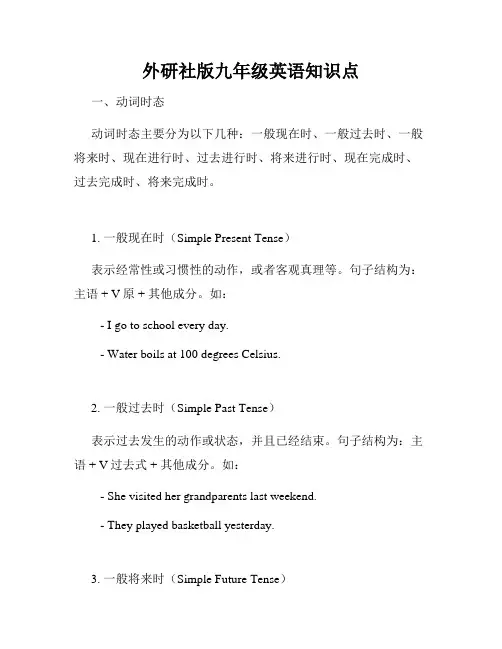
外研社版九年级英语知识点一、动词时态动词时态主要分为以下几种:一般现在时、一般过去时、一般将来时、现在进行时、过去进行时、将来进行时、现在完成时、过去完成时、将来完成时。
1. 一般现在时(Simple Present Tense)表示经常性或习惯性的动作,或者客观真理等。
句子结构为:主语 + V原 + 其他成分。
如:- I go to school every day.- Water boils at 100 degrees Celsius.2. 一般过去时(Simple Past Tense)表示过去发生的动作或状态,并且已经结束。
句子结构为:主语 + V过去式 + 其他成分。
如:- She visited her grandparents last weekend.- They played basketball yesterday.3. 一般将来时(Simple Future Tense)表示将来要发生的动作或状态。
句子结构为:主语 + will + V 原 + 其他成分。
如:- I will buy a new car next year.- They will have a party on Friday.4. 现在进行时(Present Continuous Tense)表示现在正在进行的动作,常与时间状语连用。
句子结构为:主语 + am/is/are + V-ing + 其他成分。
如:- She is reading a book now.- They are playing soccer in the park.5. 过去进行时(Past Continuous Tense)表示过去某一时刻正在进行的动作。
句子结构为:主语 + was/were + V-ing + 其他成分。
如:- He was studying when I called him.- They were watching a movie at that time.6. 将来进行时(Future Continuous Tense)表示将来某一时刻正在进行的动作。
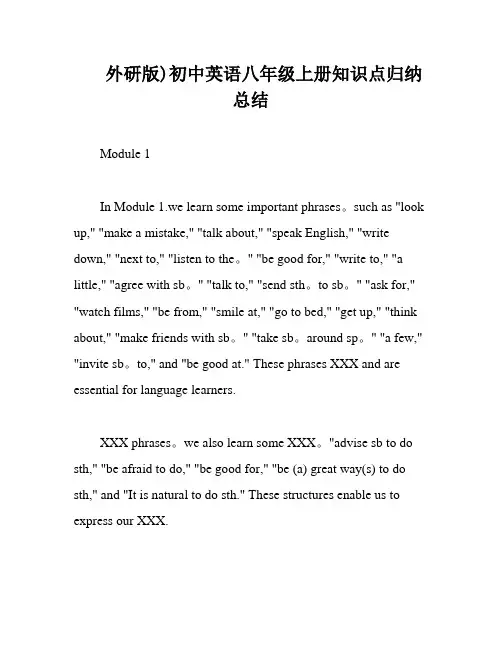
外研版)初中英语八年级上册知识点归纳总结Module 1In Module 1.we learn some important phrases。
such as "look up," "make a mistake," "talk about," "speak English," "write down," "next to," "listen to the。
" "be good for," "write to," "a little," "agree with sb。
" "talk to," "send sth。
to sb。
" "ask for," "watch films," "be from," "smile at," "go to bed," "get up," "think about," "make friends with sb。
" "take sb。
around sp。
" "a few," "invite sb。
to," and "be good at." These phrases XXX and are essential for language learners.XXX phrases。
we also learn some XXX。
"advise sb to do sth," "be afraid to do," "be good for," "be (a) great way(s) to do sth," and "It is natural to do sth." These structures enable us to express our XXX.Finally。
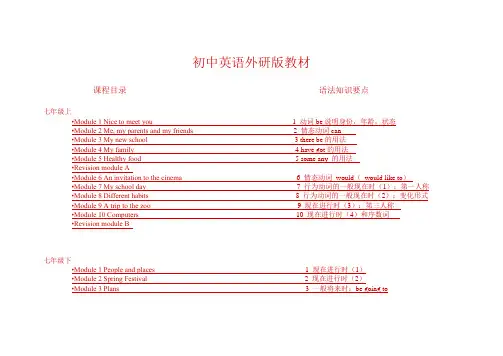
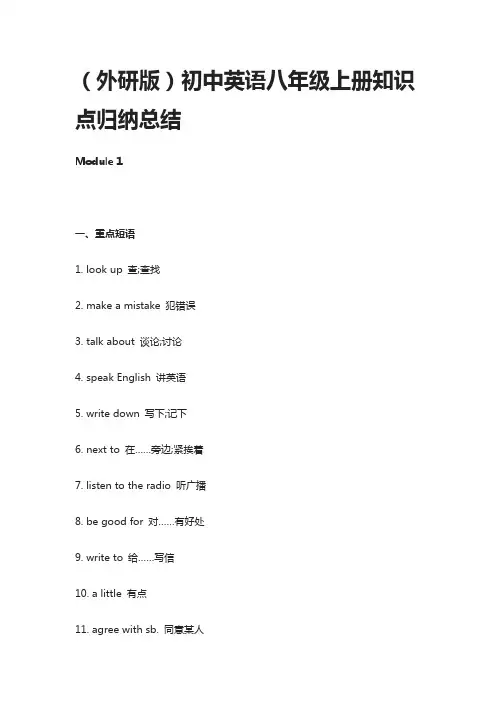
(外研版)初中英语八年级上册知识点归纳总结Module 1一、重点短语1. look up 查;查找2. make a mistake 犯错误3. talk about 谈论;讨论4. speak English 讲英语5. write down 写下;记下6. next to 在……旁边;紧挨着7. listen to the radio 听广播8. be good for 对……有好处9. write to 给……写信10. a little 有点11. agree with sb. 同意某人12. talk to 跟……交谈13. send sth. to sb. 把某物(发)送给某人14. ask for 请求15. watch films 看电影16. be from 来自17. smile at 冲……微笑18. go to bed 去睡觉19. get up 起床20. think about 考虑21. make friends with sb. 与某人交朋友22. take sb. around sp. 带领某人参观某地23. a few 几个;一些24. invite sb. to 邀请某人到……25. be good at 擅长26. for example 例如二、重点句型1. advise sb to do sth 建议某人做某事2. be afraid to... 害怕做……3. be good for... 对……有好处的4. be (a) great way(s) to do sth 做……的(一种)好方法5. It is natural to do sth. 做某事是合乎常情的。
三、重点语法1. Why not...? = Why don’t + you (we / they...)...?意为“为什么不……呢?”,后接动词原形。
eg:Why not / Why don’t we help the old cleantheir rooms this afternoon?今天下午为什么不去帮助老人打扫房间呢?2. What / How about...? 意为“……怎么样?”,其中about 是介词,后接名词或动词-ing 形式。
初一上册各模块知识点及考试重点名词所所有格:⑴表示有生命的名词的所有格其单数形式是加 's, students' rooms, father's shoes;2. 如复数结尾不是s的仍加 's,如:Children's Day;3. 在表示时间、距离、长度、重量、价格、世界、国家等名词的所有格要用 's,例如:a twenty minutes' walk,ten miles' journey,a boat's length,two pounds' weight, ten dollars' worth;4. 无生命名词的所有格则必须用of结构,例如:a map of China,the end of this term,the capital of our country, the color of the flowers;特殊情况:the key to the door/ the answer to the questionthe ticket for the concert5. 双重所有格,例如:a friend of my father's;注意如果两个名词并列,并且分别有 's,则表示“分别有”,例如:John's and Mary's rooms约翰和玛丽各有一间,共两间;Tom's and Mary's bikes两人各自的自行车;两个名词并列,只有一个's,则表示“共有”,例如:John and Mary's room约翰和玛丽共有一间;Tom and Mary's mother即Tom与Mary是兄妹;名词复数的不规则变化单复数通同形:人们说汉语和日语,瑞士人喜欢绵羊、鹿和雨fish 、sheep、deer、people、Chinese、English不规则变化:男女孩子的脚,踩住老鼠的牙Women、 men 、feet、 mice、 teeth1、would的用法①Would you like to do sth 你愿意干某事吗提出建议邀请,如果同意,用YES,I’d love to./all right /A good idea.如果拒绝,也要客气的回绝;②would like sth想要某物Would like sb to do sth想让某人做某事Would like to do 想去做一件事情③Would you please do sth 请求2、表示时间的介词At 后接时间点,周末at the weekendIn 用在年、月、季节或上午、下午、晚上等名词前On 后一般跟具体的某一天或某一天的上午、下午或晚上3、look、see、watch、readLook集中注意力看,强调看的动作,如跟宾语,要用atSee 强调看的结果,看见,看到Watch 强调专注地看,有欣赏的意味,常用语看电视,看球赛Read 阅读,看书1、would的用法①Would you like to do sth 你愿意干某事吗提出建议邀请,如果同意,用YES,I’d loveto./all right /A good idea.如果拒绝,也要客气的回绝;②would like sth想要某物Would like sb to do sth想让某人做某事Would like to do 想去做一件事情③Would you please do sth 请求2、表示时间的介词At 后接时间点,周末at the weekendIn 用在年、月、季节或上午、下午、晚上等名词前On 后一般跟具体的某一天或某一天的上午、下午或晚上初一下册重点知识2、形容词和副词形容词比较级用法:1.最明显的提示词是than,其结构为“A…+比较级+than+B”;2.有表示程度的副词a little,a bit,a few,a lot,much,even,still,far,rather,any等修饰时,用形容词比较级;3.表示两者之间进行选择“哪一个更…”时,句型“Which/Who is+形容词比较级,A or B ”4、表示“越来越……”,即“比较级+and+比较级”,多音节词和部分双音节词时用“moreand more+形容词原级”;5、表示“越……就越……”时,用“the+比较级,the+比较级”结构;形容词最高级用法:1.表示三者或三者以上的人或物进行比较时,用最高级形式;最高级前必须加定冠词the,句末常跟一个in/of短语来表示范围;2.表示在三者或三者以上的人或物进行选择时,用“Which/Who is+the+最高级,A,B or C ”3、表示“最……的……之一”时,用“one of the+形容词最高级”结构,4、形容词最高级前面可以加序数词,表示“第几最……一、词汇1、enjoyenjoy sth/doing 喜欢某物/做某件事情enjoy oneself= have a good time玩的愉快派生词:enjoyable,令人愉快的 enjoyment, 乐趣2、dress,put on, wear,be indress后常跟人作宾语,给…穿衣服,get dressed或dress oneself put on意为穿上,强调穿的动作,宾语通常是衣服、鞋帽wear穿着,戴着,强调穿的状态,宾语可以是衣帽也可以是饰品be in也表状态,后面要加颜色,表示穿着什么颜色的衣服3、 bring, take, carry 和get的用法;bring意思为“拿来”、“带来”;指将某物或某人从别处“带来”;Bring me the book, please.take意思是“拿走”,“带走”It looks like rain. Take a raincoat with you.carry 是“带着、搬运、携带”的意思, 不表明来去的方向;Do you always carry a handbagGet 是去某处将某物拿回来;Please go to my office to get some chalk.4、strict adj. be strict with sb.对某人要求严格be strict in sb 对某事要求严格5、spend人+spend+时间/金钱+ on sth/ in doing sth6、get ready forget ready for sth 为…做准备强调动作get ready to do sth 准备去做…强调动作be ready for sth 准备好… 强调状态be ready to do sth 准备好去做…强调状态get sth ready 把sth 准备好7、look forward to doing8、be good/bad atdo well/badly in9、hope 与wish的区别:希望去做… hope to do sth/wish to do sth希望sb去做… wish sb to do …hope与wish后都可以接that从句.二、金牌句型1、It is more difficult for old people to learn English.It is +adj.+for sb+to do sth.2、It is the best way to get to school.3、What’s the population of Shanghai在询问有多少人口用“What’s the population of…”/ “How large i s the population of…”表示“有多少人口”用“…have/has a population of…”形容人口的多少用large和small,而不用many,much和few,little4、有关how的疑问句短语How long… 多长时间或物体长度How soon… 过多久,用于将来时间How often… 频率How far… 多远,指距离5、What be sb like 询问某人什么样,可以是外貌或性格等;What do/does sb look like 询问相貌;初二上册考试重点一、语法1、时态的考察,对于各种时态主要看时间标志词,尤其是:just now/just/now; ago/before; five years ago/since five years ago/for five years, 时态的考察以现在完成时为重点,注意非延续性动词在现在完成加时间的情况下需要变为延续性状态的词;have been to /have been in/ have gone to2、反义疑问句祈使句Let引导的祈使句有两种情况:1Let's go home, shall we/ shan't we2Let us/me..., will you或won't you;Let me have a try, will you/won't you3动词原形开头的祈使句都用will you 或won’t you当陈述部分含I think believe, suppose...that... 结构时,其反意疑问句须与从句的主、谓语保持一致,注意主句的主语必须是第一人称;例如:I don't think he will come, will he若是非第一人称,则与主句的主语相一致He thinks that she will come, doesn’t he当陈述部分为从句时,若主句主语为 I ,反意部分的主语为从句主语;若不为 I ,反义部分的主语为主句主语;①I know your father is a worker, isn't he①she knows your father is a worker, doesn’t she当陈述部分含有以下这些含有否定意义的词时:few, little, seldom,hardly, never, not, no, no one, nobody, nothing, none, neither等,其反意疑问句需用肯定结构;例如: He is never late for school, is he陈述部分是there be句型时,其反意疑问句中要用there;There was a hospital here, wasn't there陈述部分的主语是everything, nothing, anything或something 时,反意疑问句的主语应用代词it;Something is wrong with my radio, isn't it 我的收音机出毛病了,是吧陈述部分的主语是 everybody, everyone, anybody, anyone, somebody, someone, nobody, no one, none, neither 时, 其反意疑问句的主语需用复数代词they;例如:Everyone is here, aren't they 大家都到了,是吗3、to do 不定式1. 不定式作主语时,常用it作形式主语,而将作主语的不定式放在句子后部;It is exciting to surf the Internet.It's ... of sb. to do sth.与It's... for sb. to do sth.形容词形容人的时候用of,形容事情的时候用forIt's very kind / nice of you to help me;It's hard for the Chinese students to learn Russian. 中国学生学俄语是很难的;2.动词不定式在句中作宾语,如带有宾语补足语时,要先用it作形式宾语,而将该不定式后置;注意:一些动词之后可以接to和doing作宾语时,如stop,forget,remember, try,need 等I don't think it right to do it in that way.我觉得以那种方式去做是不恰当的;I find it hard to get along with him.我发现与他相处不是件容易的事;4.作补语有些动词后跟不带to 的不定式作宾语补足语;①感官动词②使役动词③help sb. do…或help sb. to do当此类句子改为被动语态时,要补上to.He is often heard to sing this song.The workers were made to work 12 hours a day.在 think, find, consider, discover等动词后常用to be +adj.结构作宾补,有时to be 可省略;We all think/ consider/ find/ discover him to be kind and honest.动词不定式的省略1不定式在使役动词 let, have, make和感官动词 see, watch, notice , observe, hear, smell, feel, find 等后作宾补时,省略to;help 可带to,也可不带to →help sb to do sth;2 Why not 后面接不带to 的不定式;常用来表建议;Why not have a break3but和except:but/except前的部分出现实义动词do时,其后面出现的动词不定式可以不带to;比较:He wants to believe anything but to take the medicine.Last night I did nothing but to watch TV.He does everything except to work.4 由and, or或than连接的两个不定式,第二个不定式的to 可以省去;例如:He wants to move to France and marry the girl.5通常在discover, imagine, suppose, think, understand等词后,可以省去to be:He is supposed to be an honest man.4、情态动词must是重点1表示义务;意为“必须”主观意志;否定形式是needn’t,2表示揣测;意为“想必、准是、一定”等,只用于肯定句;否定形式是can’t3musn’t本身表示“禁止”,“不允许”,“不能”二、重点词汇、句型1、※What/how about doing …※Why not/wh y don’t you do…..※It is +adj.+for sb to do sth 此句型到第九模块会重点讲解2、※other 系列词3、※4、※ no one 和none5、bring, take, carry 和get的用法;bring意思为“拿来”、“带来”;指将某物或某人从别处“带来”;Bring me the book, please.take意思是“拿走”,“带走”,把某物或某人从这里“带来”或“拿到”某处之意;It looks like rain. Take a raincoat with you.carry 是“带着、搬运、携带”的意思,指随身携带,有背着、扛着、抱着、提着的含义,不表明来去的方向;Do you always carry a handbagGet 是去某处将某物拿回来;Please go to my office to get some chalk.6、through/across/overthrough 穿越,指从空间内穿越 through the dooracross,横越穿过,从表面走过,或从一边到另一边,across the roadover翻越,跨越7、provide /offerprovide sth for sb / provide sb with sthoffer sth to sb / offer sb sth主动提供8、happen / take placehappen指事件偶然发生,还可以表示“碰巧”之意,不用于被动语态sth happen to sbsb happen to do sth.It happens that+句子take place多指按计划或者安排而发生,不用于被动语态9、compare…with…比较compare…to…. 比喻10、depend on sb 依赖depend on sth 依…而定初二下册重点知识一、重点词汇1、makemake +宾语+动词原形 He made us stay with him.make +宾语+ 形容词 He tried to make his mother happymake +宾语+名词- He made me his friend.make +宾语+介词短语 He asked us to make ourselves at home.make +宾语+过去分词 What made him so frightened2、seemSeem+形容词 English seems a little difficult.Seem to do He doesn’t seem to have any friends.=It seems that he doesn’t have any friends.It seems as if they were in a dream.3、suggestsuggest+名词、代词suggest doing建议做某事suggest sb do 建议某人做某事4、refuse to do sth拒绝做某事5、beat 打败,后接运动员、球队、对手win 接比赛、战争,奖项6、avoid doing sth避免做某事7、dependdepend on sb 依赖depend on sth 依…而定8、on one’s own独自of one’s own 某人自己的9、have problem with …在哪一方面有麻烦have problem/trouble/difficulty indoing,其中trouble/difficulty是不可数名词,前面用no/much/some/little any修饰10、come up出现,发生1发芽,In March, lots of plants begin to come up.2太阳升起3发生,出现I'll let him know if anything comes up.4被提及A number of questions came up at the meeting.11、in order to、to+动词原形、so as to,so…that.so that,in order thatin order to、to+动词原形、so as to引导目的状语从句,有时为了表示强调,也可把in order to,to do放在句首,否定形式是in order not to,so as not to12、as well as并且,还,可与not only…but also互换,但是as well as强调前面的内容,not only…but also强调后面的内容1连接两个并列成分He as well as his friends likes going shopping.2as well as还可以表示“和…一样好”,well是副词,用于修饰实义动词;3as well 可单独做副词,表示“也”,位于句末;13、such adj. 如此,这样so +adj.+a/an+单数名词such+a/an+adj.+单数名词such +adj.+复数名词、不可数名词,当adj.是many/much/few/little时用so14、倒装句So + be/助动词/情态动词+主语“某人或某物也一样”I will go there tomorrow. So will she.So +主语+be/助动词/情态动词“的确如此”"It was very cold yesterday.""昨天很冷;""So it was.""的确如此;"对于上述两种情况,当前一句是否定句时, so须改用neither或nor;15、besides,but,except和except forbesides:除了......还包括He has another car besides this.but与excep t同义,但but多用在every,any,no等和由这些词构成的复合词except:除了;例句:Except you, there is no one can help me. 除了你没人能帮我except for:在一类中除去另一类,Smith is a good man, except fo r his bad temper二、语法知识1、宾语从句宾语从句的语序宾语从句的语序应为陈述句的语序;例如:I hear that physics isn’t easy.I think that you will like this school soon.Can you tell me how I can get to zooPlease tell me when we’ll have the meeting.宾语从句的时态如果主句的时态是一般现在时,宾语从句该用什麽时态就用什麽时态;I don’t think that you are right.Please tell us where he is.Can you tell me how I can get to the railway station如果主句的时态是一般过去时,宾语从句只能用相应的过去时态一般过去时, 过去进行时, 过去将来时,过去完成时;例如:He asked what time it was.He told me that he was preparing for the sports meet.He asked if you had written to Peter.知识拓展:宾从的主语与主句的主语或宾语相同时,可把从句替换为“疑问词 + to d o”①.I haven’t decided where I will go =I haven’t decided where to go②.He asked me what I bought = He asked me what to buy.2、状语从句★时间状语从句1由 when,as soon as ,before 等引导的时间状语从句用一般现在时表示将来时间;2带有till或until引导的时间状语从句的主从复合句里,如果主句用肯定式,其含义是“一直到……时”,谓语动词只能用延续性动词;如果主句用否定式,其含义是“直到……才……”, “在……以前不……”, 谓语动词可用瞬间动词;例如:The young man read till the light went out.We won’t start until Bob comes.★条件状语从句1条件状语从句遵循“主将从现”原则,一般现在时表示将来时间;2“祈使句 + and or+ 陈述句” 在意思上相当于一个带有条件状语从句的复合句;Hurry up, or you’ll be late. =If you don’t hurry up, you’ll be late.★结果状语从句结果状语从句由so…that, such…that, so that此知识点牵扯到重点词汇中的 so +adj.+a/an+单数名词such+a/an+adj.+单数名词such +adj.+复数名词、不可数名词,当adj.是many/much/few/little时用so3、to do 和doing做宾语常考的动词后加-ing.1. Enjoy doing sth 喜欢做某事2. Like doing sth 喜欢做某事3. Have fun doing sth 玩得开心4. Practice doing sth 练习做某事5. Spend doing sth 花费时间做某事主语是人6. Keep doing sth 保持一直做某事7. How about doing sth 做某事怎么样表建议8. What about doing sth 做某事怎么样表建议9. Have a difficulty doing sth 做某事有困难10. Have a good time doing sth 玩得开心11. Feel like doing sth 想要做某事12. Can’t help doing sth禁不住做某事13. start doing sth 开始做某事14. go on doing sth 继续做某事15. mind doing sth 介意做某事16. finish doing sth 完成做某事17. be busy doing sth 忙于做某事18. see/hear sb doing 看到/听到某人正在做某事19. remember doing sth 记住曾做过某事20. forget doing sth 忘记曾做过某事21. try doing sth 做某事试试看有何效果22. mean doing sth 意味着做某事23. can't help doing sth 禁不住做某事24. stop doing sth. 停止正在做的事初三上册考试重点知识一、语法知识1、时态被动语态的特殊用法:1、不及物动词带介词和介词宾语,在变为被动语态时,仍然要带上介词,如The teacher is listened to carefully by the students in class.The new students are looked after in the school.The things are take good care of .2、当动词带有符合宾语时,并且宾补是省去“to”的动词不定式时,在被动语态中应加上“to”,一感,二听,三让,四看They make us do all the work. We are made to do all the work.We often hear her sing English songs. She is often heard to sing English songs.I see him walk to school. He is seen to walk to school.3、当动词带双宾语时,将其中一个宾语提前作被动语态的主语,另一个不动; 如果是将指物或指事的宾语提前,则指人的宾语前应加上 to、for如:I am given some nice presents.They give me some presentsSome nice presents are given to me.The children are often told some stories byhimHe often tells the children some stories.Some stories are often told to the children by him.动词后加to:give,show,send,bring,lend,promise等;动词后加for: pay,buy,sing,make,get等3、定语从句修饰人只用who的情况:a. 先行词是one , ones , anyone , those 时;b. there be句型中修饰名词时;c. 先行词后有一个较长的定语;1Anyone who hasn’t handed in his home- work should stay after school.2There is a girl who wants to see you at the school gate.3Did you see the man in the park yesterday afternoon who wore a red shirt 修饰人或物只用that的情况:1 先行词是all, few, little, nothing, everything, anything 等不定代词时; All that he said is true.2 先行词被only, no, any, all,等词修饰时;He is the only foreigner that has been to that place.3 先行词是序数词或被序数词修饰的词;例如:He was the second person that told me the secret.4 先行词是形容词最高级或被形容词最高级修饰的词;This is the best book that I have read this year.5 先行词既包括人又包括物时;例如:修饰物只用which的情况:a. 先行词在定语从句中作介词的宾语时b. 先行词为that时1This is the house in which Lu Xun once lived . 这就是鲁迅以前住过的房子;2What’s that which you are holding in your arms 你抱着的那个是什么定语从句可简化为短语1.定语从句为被动语态时可简化为过去分词短语;定语从句为现在进行时可简化为现在分词短语;2.定语从句的谓语be后是介词短语,可简化为介词短语作定语;3.定语从句的谓语动词含情态动词,可简化为不定式;eg.1I bought a book that was written by Lu Xun.= I bought a book written by Lu Xun.2Tell the children who are playing there not to do that.= Tell the children playing there not to do that.3The book that is on the table is mine.= The book on the table is mine.4 We have nothing that we should fear.= We have nothing to fear.4、冠词和数词1、a/an用在序数词之前表示“再一次,又一次’2、the用在姓氏复数之前,表示“某某一家人”,“某某夫妇”;例如:the Browns, the Whites等;3.表示一个具体数字时,hundred, thousand, million一律不用复数;在表示一个不确定数字时则用复数;例如:There are three thousand students in our school.After the war, thousands of people became homeless.3 表示“……十”的数词的复数形式可用来表示人的岁数或年代,例如:He is in his early thirties.He died still in his forties.This took place in 1930s.5、主谓一致1. 语法一致的原则2并列主语如果指的是同一人,同一事物或同一概念,谓语动词用单数;例如:His teacher and friend is a beautiful girl.The poet and writer has come.3由and连接的并列单数主语之前如果分别由each, every修饰时,其谓语动词要用单数形式;例如: In our country every boy and every girl has the right to receiveeducation.4主语是单数时,尽管后面跟有 but ,except, besides, with ,as well as等短语,谓语动词仍用单数;例如:The teacher with his students is going to visit the museum.5 一些只有复数形式的名词,如people, police, cattle, clothes等作主语时,谓语动词要用复数;The police are looking for lost boy.7有两部分构成的物体的名词,如glasses, shoes, trousers, chopsticks, scissors 等作主语时,谓语动词用复数;例如:Where are my shoes I can’t find them.Your trousers are dirty. You’d b etter change them.如果这类名词前用了a pair of等,则往往用作单数,谓语动词的单复数形式往往取决于pair的单复数形式;例如: My new pair of socks is on the bed.2. 意义一致的原则1表时间、距离、价格、度量衡等的名词作主语时,谓语动词通常用单数;例如:Twenty years is not a long time.Ten dollars is too dear.2有些集合名词,如family, team等作主语时,如作为一个整体看待,谓语动词用单数;如指其中每个成员,则用复数;例如:My family is big one.My family are watching TV.5“分数或百分数/the rest+of+名词”构成的词组作主语时,其谓语动词要以of后面的名词而定;名词是复数,谓语动词用复数:名词是单数,谓语动词用单数;例如:It is said that 35 per cent of the doctors are women.Three –fourths of the surface of the earth is sea.8凡是以“定冠词+形容词或分词”作主语,往往根据意义一致的原则决定谓语动词的单复数形式;如果这种主语指的是一类人,谓语动词用复数;如果指的是一个人或抽象概念,谓语动词用单数形式;例如:The sick have been cured and the lost have been found.The dead is a famous person.3. 邻近一致的原则1由连词or, either……or,neither……nor, not only…but also,等连接的并列主语,如果一个是单数,一个是复数,则谓语动词按就近一致原则,与最靠近它的主语一致;例如:Either you or I am right.Neither the children nor the teacher knows anything about it.2在“There be” 句型中,谓语动词和靠近的主语一致;There are two apples and one egg in it.4以here开头的句子,其谓语动词和靠近的主语一致;Here is a letter and some books for you.词汇1、do some reviews about表示“对......做评论”;do an interview with表示“采访......”.2、too……to 太……而不能He is too young to go to schoolso…that 如此…以至于,…enough to…,注意同义句转换3、as far as 就…而言,据…as long as 只要:I don't mind as long as it doesn't rain.as soon as一…就…I'll write you as soon as I get there.as well as和…一样He grows flowers as well as vegetables.4、please两个意思,一个是请,一个是取悦,Mark treid to please Jen.pleased,感到愉悦的,高兴的pleasure,名词,相当于fun,can you open the door for me My pleasure.pleasant,是形容词,舒服的,宜人的such a pleasant day5、allow/encourage/advise sb to dosb be allowed/encouraged/advised6、prefer to do…rather than do…prefer doing A to doing Bwould rather do …than do…would rather do…than do….do A instead of doing B7、above all,after all,first of all,in allabove all,尤其是,最重要的是,强调内容的重要性after all 毕竟,终究first of all 首先,表示顺序上的首先in all 总共8、instead of /insteadinstead of 是介词短语,常位于句中,而instead是副词,可置于句中,常用逗号与句子主干分开,也可直接置于句末,通常用于上文已经说明的被代替的对象;He is too busy, let me go instead.9、in order to、to+动词原形、so as to,so…that.so that,in order thatin order to、to+动词原形、so as to引导目的状语从句,有时为了表示强调,也可把in order to,to do放在句首,否定形式是in order not to,so as not to10、some time 一段时间sometime 某个时候sometimes 有时候some times 几次11、be used to do 被用来做某事be used to dong 习惯于used to do 曾经12、no one 和none13、so +adj.+a/an+单数名词such+a/an+adj.+单数名词such +adj.+复数名词、不可数名词,当adj.是many/much/few/little时用so14、be supposed to do被期望或要求; 应该suppose that假定15、progress,不可数名词make progress16、倒装句So + be/助动词/情态动词+主语“某人或某物也一样”I will go there tomorrow. So will she.So +主语+be/助动词/情态动词“的确如此”"It was very cold yesterday.""昨天很冷;""So it was.""的确如此;"对于上述两种情况,当前一句是否定句时, so须改用neither或nor;初三下册知识重点一、词汇1、debate v.&n.辩论1debate about sth.争论某事2debate with sb.与某人争论2、neither 和none1neither“两者都不”,是both的反义词,neither,neither of作主语时,谓语动词用单数形式,Neither of the two boys is right.N either…nor…既不…也不…,主谓一致遵循就近原则2none 三者或三者以上都不,none和none of做主语时,谓语动词单复数皆可;3、prevent防止,预防主要考点:prevent ;;;from sth/doing sth 阻止…做…=keep /stop …..from…..4、absent缺席的,不在场的反义词:present短语:be absent from缺席5、supposebe supposed to do被期望或要求; 应该suppose that假定6、lead a…life过着…的生活7、关于off的词组Set off 出发put off 推迟give off发出〔光、热、气味等〕Get off 下车turn off 关闭hurry off匆忙离开... Fall off 跌落go off 爆炸8、fit 合适,合身9、success 名词,成功 The meeting is a great success.successful 形容词,成功的 The meeting is successful.succeed 动词,成功 He succeeded in teaching.10、suggestion 可数名词 some suggestionsadvice 不可数名词 some advice 、 a piece of advicesuggest sb do sth advise sb to do sth11、do damage to 对…造成损害do harm/good to 对…有害no good doing做某事没好处no good to sb 对某人无益12、make effort to do sth努力去做某事13、miss1想念 I will miss you.2错过 He missed the train.3不见了 Who is missing14、a large amount of 大量的,修饰可数名词复数形式;只修饰名词复数:many / several/ a few / few/ alarge number of 只修饰不可数名词:much/ a little/ a great deal of即可修饰不可数名词又可修饰名词复数的:a lot of/plenty of15、have effect on对;;;造成影响make differences to 对…造成影响16、give in 屈服give up 放弃17、in other words换句话说in a word 总而言之have words with sb 和某人吵架18、help oneself to 慢慢享用19、not…any more不再数量上不再=no more 但是在句子中的位置不同not …any longer时间上不再= no longer20、be named after;;;以;;;命名21、above all,after all,first of all,in allabove all,尤其是,最重要的是,强调内容的重要性after all 毕竟,终究 at fist 开始,起先,带有转折之意first of all 首先,表示顺序上的首先 in all 总共22、achieve完成,达到,收获achieve a high levelachieve great progress23、no matter…无论… 引导让步状语从句之后加疑问词24、in place of代替与instead ofinstead of代替……,而不是……用在名词,代词或介词短语前We will go by bus instead of on foot.我们坐车去,而不是步行;in place of与instead of意思相同;书面语,代替某人可说in sb's placeWe use gas in place of coal in cooking.我们用煤气代替煤作饭Our monitor is away. I am action in place of him.我们班长不在,我代替他的职务.take the place of 取代,代替做谓语,用在名词,代词前Tractors have taken the place of horses in many places.在许多地方拖拉机代替了马25、be essential fo r …对…极其重要26、What’s more 并且,进一步说27、from the bottom of one’s heart 由衷地…28、owe to 归功于owe sth to sth 把…归功于…owe sth to sb 欠某人某物29、pay back 偿还30、apply for 申请二、语法知识感叹句:感叹句是表示喜、怒、哀、乐以及惊异等感情的句子;句末用感叹号“”,读时用降调,感叹句往往由what或how引导,what修饰名词,how修饰形容词,副词或动词;1. what引导的感叹句:1what + a/an +形容词+单数可数名词+陈述句主语+谓语What a beautiful city it isWhat an interesting story she told2what+形容词+复数可数名词/不可数名词+陈述句主语+谓语What expensive watches they areWhat terrible weather it is2.How引导的感叹句:1How+形容词/副词+陈述句主语+谓语How cold it isHow hard he works2How+陈述句主语+谓语How he loves his sonHow I miss you3How+形容词+a/an+单数可数名词+陈述句主语+谓语How tall a tree it is4上述两种感叹句可以互相转换;例如:What a clever boy he is→How clever the boy isWhat a cold day it is→How cold it is。
九年级英语上册知识点总结Module1 Wonders of the world一、重点短语1.wonders of the world世界奇观2.natural wonders自然奇观3.join in = take part in参加;加入(活动)4.agree with sb.同意某人的看法5. agree to do sth.同意做某事6.in one’s opinion依某人看来;按某人的意见7.more than = over多于,超过8. millions of数百万的;数以百万计的9.produce electricity供电10.would like to do sth. = want to do sth.想做某事11.get out of...从....出来12.become grey变成灰色13.look across眺望, 向对面看14.look down to俯视;向下看15.go down下去;下沉;坠落16.look over从(某物上面)看过去:仔细检查17. go through穿过,经历,经受,浏览18.at the bottom of在.....的底部19.on both sides在两边20.in height高度;在高度上21. do an interview with sb.采访某人22.draw a picture of画一副......的图画23.fall away突然向下倾斜24.wait for等候25.dozens of许多26.be famous for以.......而闻名二、固定结构1. sb./sth agrees with sth.某人/某物适应(食物、气候)/符合某物,I don't think the food here agrees with me. 我觉得这里的食物不对我的胃口His explanation agrees with the facts of the situation.他的解释与实情相符。
外研版七年级上册英语知识点归纳摘要:一、外研版七年级上册英语知识点归纳1.问候与告别2.介绍与问候3.欢迎与回应4.礼貌用语5.be 动词的用法6.人称及人称代词的不同形式7.同义句正文:一、外研版七年级上册英语知识点归纳在初中英语学习中,外研版七年级上册的知识点涵盖了日常生活、语言交流等方面的内容。
为了帮助大家更好地掌握这些知识点,本文将对其进行归纳整理。
1.问候与告别在英语中,问候与告别是非常基本的日常交流用语。
常见的问候用语有:good morning(早上好)、good afternoon(下午好)、good evening(晚上好),而告别用语则有:good night(晚安)。
2.介绍与问候在英语中,介绍自己或他人时,通常需要用到人称代词的主格和宾格形式。
例如,I(我)是主格,me(我)是宾格;you(你)是主格,your(你的)是宾格等。
在介绍他人时,我们通常使用“This is...”这个句型。
3.欢迎与回应当迎接他人时,我们通常会使用“Welcome to...”这个句型表示欢迎。
例如:Welcome to our school(欢迎来到我们学校)。
而他人表示感谢时,通常会回答“Thank you”或“Thanks”。
4.礼貌用语在英语中,礼貌用语是非常重要的。
常见的礼貌用语有:please(请)、thank you(谢谢)、you"re welcome(不客气)、excuse me(对不起)等。
5.be 动词的用法be 动词是英语中最基本的动词之一,它有三种变形:am、is、are。
记忆口诀为:“我”用am,“你”用are,is 用于“他、她、它”;单数全都用is,复数全部都用are。
6.人称及人称代词的不同形式人称代词有主格和宾格之分。
例如:I(我,主格)和me(我,宾格);you(你,主格)和your(你的,宾格)等。
在英语中,主格通常用于句子的主语位置,而宾格则用于动词和介词之后。
七年级上册外研版英语课堂笔记一、Module 1 My classmates。
1. 重点单词。
- nice:adj. 美好的;令人愉快的。
例如:She is a nice girl.(她是一个好女孩。
)- to:prep. 到;向。
例如:Welcome to Beijing.(欢迎来到北京。
)- meet:v. 遇见;结识。
例如:Nice to meet you.(很高兴见到你。
)- classmate:n. 同学。
例如:He is my classmate.(他是我的同学。
)- his:pron. 他的。
例如:His name is Tom.(他的名字是汤姆。
)- her:pron. 她的。
例如:Her book is very interesting.(她的书非常有趣。
)2. 重点短语。
- be from:来自。
例如:I am from China.(我来自中国。
)- Nice to meet you:很高兴见到你。
这是初次见面时常用的打招呼用语,回答通常是“Nice to meet you too”。
3. 重点句型。
- What's your name? 你叫什么名字?这是询问他人名字的常用句型,回答可以是“My name is...”或者“I'm...”。
- I'm from... 我来自……,用来介绍自己的籍贯。
例如:I'm from Shanghai.(我来自上海。
)二、Module 2 My family。
- family:n. 家;家庭。
例如:This is my family.(这是我的家庭。
)- father:n. 父亲;爸爸。
例如:My father is a teacher.(我的爸爸是一名教师。
)- mother:n. 母亲;妈妈。
例如:My mother likes cooking.(我的妈妈喜欢做饭。
)- sister:n. 姐妹。
例如:My sister is a student.(我的姐姐是一名学生。
外研版七年级英语语法整理一、介词(Prepositions)介词是一种在句子中表示关系的词语,常见的介词有:at, in, on, to, by, with等。
1.在时间和地点上使用介词:•at:用于“某一时刻”或“某一时间点”,如at 8 o’clock / at night / at the weekend;•in:用于“持续一段时间”,如in the morning / in summer / in 2005;•on:用于“某一天、日期或节日”,如on Monday / on December 25th / on Christmas Day。
2.表示方向的介词:•to:表示“朝向某个地方”,如go to school / walk to the park;•from:表示“从某个地方来”,如come from Beijing;•into:表示“进入某个地方”,如go into the room;•out of:表示“离开某个地方”,如get out of the car。
3.还有其他表示方式的介词:•by:表示“通过某种方式”,如by bus / by bike;•with:表示“伴随着某人或某物”,如with my parents / with a pencil;•for:表示“为了某人或某物”,如buy a gift for my friend。
二、冠词(Articles)冠词是一种词类,分为定冠词(the)和不定冠词(a / an)。
1.不定冠词的使用:•a:用于单数名词以辅音音素(consonant)开头的情况,如a book / a desk;•an:用于单数名词以元音音素(vowel)开头的情况,如an apple / an egg。
2.定冠词的使用:•the:用于特定的人或物,表示“唯一性”,如the sun / the moon / the school。
3.不使用冠词:•一般情况下,不使用冠词表示泛指或抽象意义,如I like music(我喜欢音乐)。
初中外研英语语法知识点总结一、名词。
1. 名词的分类。
- 专有名词:表示特定的人、地方、组织等,首字母大写,如China(中国),Tom(汤姆)。
- 普通名词:又分为可数名词(如book - books,pen - pens)和不可数名词(如water,rice)。
2. 名词的复数形式。
- 一般情况加 - s,如cat - cats,dog - dogs。
- 以s,x,ch,sh结尾的加 - es,如bus - buses,box - boxes,watch - watches,dish - dishes。
- 以辅音字母 + y结尾的,变y为i加 - es,如baby - babies;但以元音字母+ y结尾的,直接加 - s,如boy - boys。
- 以f或fe结尾的,有些变f或fe为v加 - es,如knife - knives,leaf - leaves;有些直接加 - s,如roof - roofs。
- 不规则复数形式,如man - men,woman - women,child - children,foot - feet,tooth - teeth等。
3. 名词所有格。
- 有生命的名词所有格:- 一般情况加's,如Tom's book(汤姆的书)。
- 以s结尾的复数名词加',如students' classroom(学生们的教室)。
- 表示两者或多者共有时,最后一个名词加's,如Tom and Jerry's room(汤姆和杰瑞的房间);表示各自所有时,每个名词都加's,如Tom's and Jerry's toys (汤姆的和杰瑞的玩具)。
- 无生命的名词所有格用“of + 名词”结构,如the window of the room(房间的窗户)。
二、冠词。
1. 不定冠词a/an。
- a用于以辅音音素开头的单词前,如a book;an用于以元音音素开头的单词前,如an apple。
Module 1 重点词组1. “欢迎回到某地”welcome back to +地点名词如:欢迎回到学校welcome back to school热烈欢迎某人:give sb a warm welcome不用谢:You are welcome2. 首先:first of all (放句首)3.失物招领:lost and found失物招领箱:lost and found box在失物招领箱中:in the lost and found box4. 某人有某物:have(got)/has(got)= have/has某处有某物:there be(is/are)There be 的be动词的单复数根据“就近原则”变化(be动词与离它最近的主语在数上保持一致如:(1)桌子上有一支钢笔和一些书There is a pen and some books on the desk. (这里要用is,因为靠近它的名词a pen,是单数)(2)桌子上有一些书和一支钢笔There are some books and a pen on the desk,.(这里用are,因为靠近它的名词是some books,是复数) 5.谁的:?这是Lucy6. 在这儿/如果主语是名词要用全部倒装(谓语动词放在主语之前),如果主语是代词用部分倒装如:这儿有一封信。
Here is a letter.(letter是名词,要全部倒装,letter要放在谓语动词is后)它在这儿。
Here it is.(it是代词,要部分倒装,it放is前面)7.照顾:take care of = look after小心(照顾、做、处理):be careful with+名词小心做某事:be careful to do sth如:小心鸡蛋:Be careful with the eggs.小心地把鸡蛋拿到厨房:Be careful to take the eggs to the kitchen.8.从现在开始:from now on9.男士钱包:wallet 女士钱包:purse10.与。
交谈:talk to=talk with+人谈论。
:talk about+人/物如:我妈妈正在和我老师谈论我的学习。
My mother is talking to/with my teacher about my study.11.上车:get on 下车:get off与某人相处融洽:get on/along well with sb与某人相处得不好:get on badly with sb询问“与某人相处得怎么样”要用how提问如:我和他一直相处融洽:I always get on well with him.我和他一直相处得不好。
I always get on badly with him.你与你的父母相处得怎么样?How do you get on with your parents?很融洽:Quite well.12. leave(1)作动词:A.“离开,动身去某地”,通常与for 连用如:我明天动身去香港:I’m leaving for Hong Kong tomorrow.B. “把(某人或某物)留在/遗忘(某地)”,通常后面接“地点”如:我经常把钥匙忘在家里:I often leave my key at home。
(2)作名词:表“假期、休假”如:我想请两天假/ 一星期假:I want to ask for two days’ leave./ a week’s leave.13. 这是…..的原因That’ s why +结果如:这就是我今早没吃早餐就上学的原因That’s why I go to school without breakfast.(没吃早餐上学是表结果)14.百:hundred 千:thousand(1)如果前面有具体数字,hundred/thousand不加s,也不加of如:二百:two hundred (hundred前面有具体数字二,所以不加s和of)四千:four thousand(thousand前面有具体数字四,所以不加s和of)(2)当hundred/ thousand 和of 连用时,它要用复数形式(加s)如:成百上千:hundreds of (hundred后面有of,所以要加s)成千上万:thousands of (thousand后面有of,所以要加s)15.寻找:look for/ find(1)look for 强调“找”的过程,find强调“找”的结果如:我到处找我的猫咪,但我找不到它。
I look for my cat everywhere, but I can’t find it.(到处找猫咪,表示找的过程,所以用look for;找不到猫咪是找的结果,用find)(2)Look at:看look after照顾look out of 向外看16.这是…?’t.? 这些是…? ’t.如:Is this your bag?这是你的包吗?是的,它是。
Yes, it is.Are these her books?这些是她的书吗?不,它们不是。
No,they aren’t。
Module 2重点词组17.Play:弹,打,下(棋)(1)后接乐器,加定冠词the:如:弹钢琴/ 吉他:play the piano/ guitar(钢琴和吉他是乐器,所以前面要加定冠词the)(2)后接棋类或球类名词,不加定冠词the:如:踢足球:play football 下象棋:play chess18. would like to do sth 想要/ 愿意做某事如:我想要和我妈妈去市场。
I’d like to go to the market with my mother.(I’d like to = I would like to)19. What about= How about…?怎么样?(1)about后面可以加名词和代词如:这本书怎么样?What about/ How about this book?(书book是名词)你呢?What about/ How about you?(你you是代词)(2)about是介词,后面加动词,要用ing形式如:休息一下怎么样?What about/How about having a rest?(休息是动词,所以接在about20. worry about:担心,担忧(1)后加名词和代词:如:不用担心汉语Don’t worry about Chinese. ( 汉语Chinese是名词)我父母总是担心我。
My parents always worry about me.( 我me是代词)(2)后加动词要用ing形式,因为about是介词如:别担心游泳Don’t worry about swimming.21. teach教(1)教某人某物:teach sb sth (sb是代词时要用宾格)如:这学期谁教我们数学?Who teaches us maths this term?(us我们是人,要用宾格;数学math是物)(2)没有teach sb to do sth22.骑自行车:ride a bke:打乒乓球:play table tennis:说中文:speak Chinese 在布告牌上:on the board仅此而已: that’s all 你呢?what about/ How about you?我喜欢做饭:I like cooking。
课间:between lessons23. 跑得快:run fast 擅长:be good at 对。
有好处:be good for在每场比赛中取得最好的分数:get the best score in every match24. 帮助help(1)加动词:help sb (to)do sth 帮助某人做某事(2)加名词:help sb with sth 帮助某人做某事如:大明帮我学英语学learn是动词,所以用(to)do sth)Daming helps me with my English.( 英语english是名词,所以用with)25. start开始(1)做名词:如:开学之初:the start of the new term(2)做动词:开始做某事如:学生开始唱歌。
The students start to sing.= The students start singing.(唱歌是动词)26.准备/ 乐于做某事:为。
做好准备:如:她总是乐于助人。
She is always ready to help others . (帮助help是动词,用to do sth)我们为春节做准备。
We are ready for the Spring Festival.(春节时名词,用for)27. 选某人作为:choose…as/ for…如:我们选大后要用ing形式)明作为班长。
We choose Daming as/ for our monitor.28. 承诺、保证、答应:promise(1)加名词:promise sb sth = promise sth to sb 向某人承诺某事如:他答应给我这本书。
He promise me the book.= He promise the book to me.(2) 加动词:承诺做某事如:他承诺帮助我们。
He promises to help us。
29. 健康的(形容词):fit= healthy 健康(名词):fitness= health保持健康:keep/ stay fit= keep/ stay healthy30. 做某事:do+ (some)+ V-ing打扫卫生:do some cleaning 看书:do some reading买东西:do some shopping 洗衣服:do some washing31. 每个人:everyone= everybody 做主语时,谓语动词用单数如:每个人都在这。
Everyone / everybody is here.每个人都喜欢运动。
Everyone / everybody likes sports.32. be sure(1):确信某事一定会如:我确信他住在北京。
I am sure he lives in Beijing. (he lives in Beijing是从句)(2) be sure of/ about +名词、动名词(V-ing):“确信。